

Class Action: Jacobin Activist Teacher's Handbook. Are Teachers Professionals? Analysis of the Professional Status of US Teachers by Jason T. Hilton. Slippery Rock UniversitySeptember 20, 2013 Abstract: In the United States, those who teach currently face opposition from a variety of sources that seek to weaken the professional status of teachers.
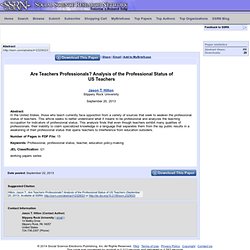
This article seeks to better understand what it means to be professional and analyzes the teaching occupation for indicators of professional status. This analysis finds that even though teachers exhibit many qualities of professionals, their inability to claim specialized knowledge in a language that separates them from the lay public results in a weakening of their professional status that opens teachers to interference from education outsiders. Number of Pages in PDF File: 15 Keywords: Professional, professional status, teacher, education policy-making.
A video that shows why teachers are going out of their minds. The video below is not a parody.
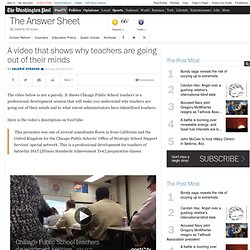
It shows Chicago Public School teachers in a professional development session that will make you understand why teachers are going out of their minds and to what extent administrators have infantilized teachers. Here is the video’s description on YouTube: Chicago Teacher Explains the Infamous Viral PD Video She Shot - Living in Dialogue. About two weeks ago I saw a video of a Chicago "professional development" session posted on Facebook.

Shortly thereafter, it appeared here in Valerie Strauss' Answer Sheet blog, and has been viewed more than 126,000 times since then. Today, for the first time, I share the firsthand account of the teacher who recorded this session. Due to the tense environment in Chicago, she has asked to remain anonymous, but was connected to me by a trusted source who has worked for years in the Chicago schools. Should the U.S. Follow South Korea's Education System? Advances in education: How to teach. Education standards: Best and brightest. A dozen basic guidelines for educators. D.C. teacher Vanessa Ford and student (By Amanda Voisard / The Washington Post) Do we really need education policies and practices to cover everything that goes on in the classroom?
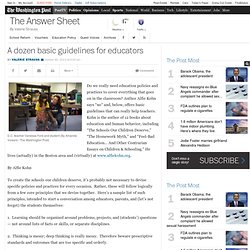
Author Alfie Kohn says “no” and, below, offers basic guidelines that can really help teachers. Kohn is the author of 12 books about education and human behavior, including “The Schools Our Children Deserve,” “The Homework Myth,” and “Feel-Bad Education… And Other Contrarian Essays on Children & Schooling.” Teacher Training's Low Grade. Want to Ruin Teaching? Give Ratings. Merit Pay, Teacher Pay, and Value Added Measures. D Pink Eight brief points about “merit pay” for teachers. The High Cost of Low Teacher Salaries. A Very Mean (But Maybe Brilliant) Way to Pay Teachers - Jordan Weissmann. A Freakonomics author and a 'Genius Grant' winner suggest that giving teachers bonuses, then threatening to yank them away, might be the key to classroom success (Reuters) One of the great, early insights from the field of behavioral economics was that when it comes to handling money, most people are driven much more by fear than they are by greed.

The concept is called "loss aversion. " Faced with a financial choice -- say, whether to sell a stock or hold onto it -- the majority of us are more likely to worry about blundering away what we already have than get excited about the prospect of adding to our bank accounts. Principal: Why our new educator evaluation system is unethical. Here’s a new post from award-winning Principal Carol Burris of South Side High School in New York about the state’s controversial new educator evaluation system.
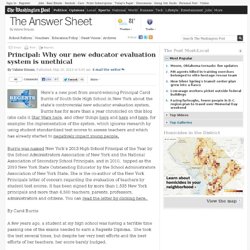
Burris has for more than a year chronicled on this blog (she calls it Star Wars here , and other things here and here and here , for example) the implementation of the system, which ignores research by using student standardized test scores to assess teachers and which has already started to negatively impact young people. Burris was named New York’s 2013 High School Principal of the Year by the School Administrators Association of New York and the National Association of Secondary School Principals, and in 2010, tapped as the 2010 New York State Outstanding Educator by the School Administrators Association of New York State. She is the co-author of the New York Principals letter of concern regarding the evaluation of teachers by student test scores. Things educators could say but don’t. With reform policies based more on hope than data, you might think educators would speak up more than do.
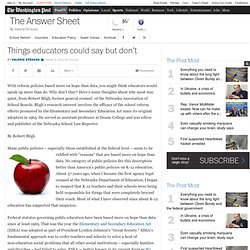
Education: The Invisible Profession. “I am an invisible man,” announces the unnamed narrator of Ralph Ellison’s Invisible Man, adding: I am invisible, understand, simply because people refuse to see me….When they approach me they see only my surroundings, themselves, of figments of their imaginations—indeed, everything and anything except me….That invisibility to which I refer occurs because of a peculiar disposition of the eyes of those with whom I come in contact….you often doubt if you really exist….It’s when you feel like this that, out of resentment, you begin to bump back.
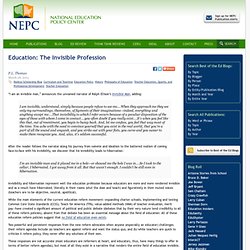
And, let me confess, you feel that way most of the time. You ache with the need to convince yourself that you exist in the real world, that you’re a part of all the sound and anguish, and you strike out with your fists, you curse and you swear to make them recognize you. And, alas, it’s seldom successful. Teachers - Will We Ever Learn? Why Great Teachers Are Fleeing the Profession. Why Do Teachers Quit? - Liz Riggs. Richard Ingersoll taught high-school social studies and algebra in both public and private schools for nearly six years before leaving the profession and getting a Ph.D. in sociology.

Now a professor in the University of Pennsylvania’s education school, he’s spent his career in higher ed searching for answers to one of teaching’s most significant problems: teacher turnover. Teaching, Ingersoll says, “was originally built as this temporary line of work for women before they got their real job—which was raising families, or temporary for men until they moved out of the classroom and became administrators. The 6 Ways Teachers Want To Change Schools. The results of the recently released MetLife Survey of the American Teacher weren’t surprising to many teachers, as it chronicled a steep decline in teacher job satisfaction. In fact, teachers’ job satisfaction is at its lowest level since 1987. Of the 1,000 teachers polled, only 39 percent claimed they were “very satisfied” with their profession. Teacher: How my job went from great to infuriating. (By Linda Davidson – The Washington Post) Here’s a call for the end of high-stakes standardized tests from a teacher who chronicles how he approached his job before and after No Child Left Behind.
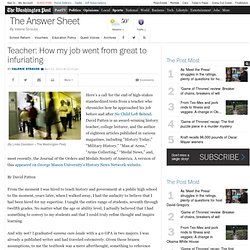
David Patten is an award-winning history teacher, college lecturer, and the author of eighteen articles published in various magazines, including “History Today,” “Military History,” “Man at Arms,” “Arms Collecting,” “Medal News,” and, most recently, the Journal of the Orders and Medals Society of America. A version of this appeared on George Mason University’s History News Network website.
By David Patten. Why Not Ask Teachers How They Would Improve Our Schools? We were sitting in a Starbucks in Arlington, Va. It was our first meeting. Previously, Iowa governor Tom Vilsack and I had talked by phone and exchanged blog posts on education. Chicago school day: A teacher responds. By Xian Barrett, Special to CNN Editor’s note: Xian Barrett teaches law and Chicago history at Gage Park High School in Chicago, Illinois.
In 2009, he was selected one of ten Classroom Teaching Ambassador Fellows by the U.S. Department of Education. This article is in response to comments on a previous story about Chicago teacher work days. Teachers' Views on Elevating the Teaching Profession. The Best Teachers in the World. Favor experience over credentials, hire the most qualified, and let principals lead. By John E. Chubb. For all the talk among political leaders about being first in the world in math and science or otherwise having the best schools and highest achievement in the world, there is little talk about having the best teachers. Yet research is increasingly clear that that is exactly what the aim of top achievement requires.
If the United States wants the best achievement in the world, it will need to seek out, train, and retain the best teachers in the world. Consider: the United States is now in the process of trying to establish high common academic standards for public school students. Today’s teachers, however, do not come close to meeting the academic standards being set for students. The Mystery of Good Teaching. Who should be recruited to fill the two to three million K-12 teaching positions projected to come open during the next decade? What kinds of knowledge and training should these new recruits have? These are the questions confronting policymakers as a generation of teachers retires at the same time that the so-called baby boom echo is making its way through the education system. Key to answering these questions is knowing how much influence teachers have over student achievement and what specific teacher attributes lead to higher student achievement.
For instance, does holding a master’s degree make one a better teacher? The 7-lesson schoolteacher John Taylor Gatto. The 7-Lesson Schoolteacher by John Taylor Gatto New Society Publishers, 1992 Call me Mr. Gatto, please. Twenty-six years ago, having nothing better to do at the time, I tried my hand at schoolteaching. The license I hold certifies that I am an instructor of English language and English literature, but that isn't what I do at all. I don't teach English, I teach school -- and I win awards doing it. Is the Lecture Dead? - Richard Gunderman. Why School Should Focus on Engagement Instead of Lectures.
Each school day, millions of students move in unison from classroom to classroom where they listen to 50- to 90-minute lectures. Despite there being anywhere from 20 to 300 humans in the room, there is little actual interaction. Bloom’s 2 Sigma Problem « Isegoria. Teachers’ Most Powerful Role? Adding Context. Rethink Teacher Appreciation Week. What teachers don’t need (but are getting anyway) - The Answer Sheet. This was written by Paul Thomas, an associate professor of education at Furman University in South Carolina. 5 simple ways to help your child's teacher. Crazy things people say to teachers – and how to respond. The Learning Pyramid: Does It Point Teachers in the Right Direction? Power of Art: Can painting improve your grades? Why Teach and Study English? Whence, and where, and why the English major? The subject is in every mouth—or, at least, is getting kicked around agitatedly in columns and reviews and Op-Ed pieces.
The English major is vanishing from our colleges as the Latin prerequisite vanished before it, we’re told, a dying choice bound to a dead subject. The estimable Verlyn Klinkenborg reports in the Times that “At Pomona College (my alma mater) this spring, 16 students graduated with an English major out of a student body of 1,560, a terribly small number,” and from other, similar schools, other, similar numbers. In response, a number of defenses have been mounted, none of them, so far, terribly persuasive even to one rooting for them to persuade.
Number of the Week: U.S. Teachers’ Hours Among World’s Longest - Real Time Economics. What teachers need and reformers ignore: time to collaborate. The End of Teachers Unions. Why I’m Getting Arrested: A North Carolina Teacher Speaks Out. How Texas Inflicts Bad Textbooks on Us by Gail Collins. Chicago's teachers could strike a blow for organised labour globally. ChicagoNow. Seattle’s Teacher Uprising: High School Faculty Faces Censure for Boycotting Standardized MAP Tests. System Failure: The Collapse of Public Education - Page 1 - News. WAR ON EDUCATION AND STUDENTS. Michigan school district lays off all its teachers. At Occupy the DOE, A Push for Democratic, Not Corporate, Education Reform. “Indescribably insane”: A public school system from hell. Why Arne Duncan is threatening to withhold funds for poor kids. Predicting success in football and teaching. Atlanta Cheating Scandal Lesson: We Must Return to Real Teaching and Learning.
Teacher’s resignation letter: ‘My profession … no longer exists’ It's Time for a Real Code of Ethics in Teaching - Noah Berlatsky. Confusion in Atlanta as Educators Are Set to Be Jailed. How teacher turnover harms student achievement. San Diego Charter Teachers: Bullying Contributed to Death of Colleague - Living in Dialogue.